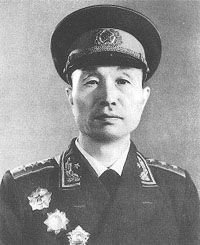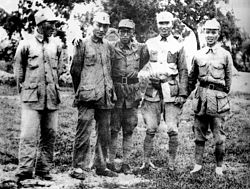| This article needs additional citations for verification. Please help improve this article by adding citations to reliable sources. Unsourced material may be challenged and removed. Find sources: "Zhang Aiping" – news · newspapers · books · scholar · JSTOR (July 2009) (Learn how and when to remove this message) |
| Zhang Aiping | |
|---|---|
| 张爱萍 | |
 | |
| State Councilor of China | |
| In office 19 November 1982 – 12 April 1988 | |
| Premier | Zhao Ziyang Li Peng |
| 6th Minister of National Defense | |
| In office 19 November 1982 – 12 April 1988 | |
| Premier | Zhao Ziyang Li Peng |
| Preceded by | Geng Biao |
| Succeeded by | Qin Jiwei |
| Vice Premier of the People's Republic of China | |
| In office September 1980 – September 1982 | |
| Premier | Zhao Ziyang |
| Personal details | |
| Born | Zhang Duanxu (张端绪) (1910-01-09)January 9, 1910 Da County, Sichuan, Qing Dynasty (now Dachuan District, Sichuan, China) |
| Died | July 5, 2003(2003-07-05) (aged 93) Beijing, China |
| Political party | Chinese Communist Party |
| Alma mater | Counter-Japanese Military and Political University |
| Awards |
|
| Military service | |
| Allegiance | |
| Branch/service | |
| Years of service | 1929–1987 |
| Rank | General |
| Battles/wars | |
Zhang Aiping (Chinese: 张爱萍; Wade–Giles: Chang Ai-p'ing; January 9, 1910 – July 5, 2003) was a Chinese military leader.
Biography


Zhang joined the Chinese Communist Party in 1928 after taking part in a communist-led rural uprising. He participated in the Long March and served as a field commander in the Chinese Red Army, first fighting against Chiang Kai-shek's Kuomintang forces, and later the Imperial Japanese Army in the Second Sino-Japanese War. During World War II Zhang commanded a guerrilla band sent to rescue U.S. flight crews who crash landed in China following the April 1942 Tokyo bombing raid led by Lieutenant Colonel Jimmy Doolittle.
After 1949, Zhang was an important builder of the Chinese military forces. He commanded the first People's Liberation Army naval force and served as an army corps commander in the Korean War. Upon his return home he served in a series of significant military and political posts. He was made a General in 1955.
Zhang supervised the Two Bombs, One Satellite project and successfully directed the development of China's nuclear deterrent. However, he was accused of counterrevolutionary crimes and dismissed from all positions during the Cultural Revolution, when many veteran communists were attacked by Red Guards inspired by Mao Zedong's vision of continuous revolution, and one of his legs was broken as a result. Later, Zhang would comment: "The only thing the Cultural Revolution succeeded in was giving me a cane."
He reappeared in 1973 and chaired the Defense Technology Commission of the People's Liberation Army. During this time he attempted to rein in poor quality from armament factories by reestablishing government oversight over facilities which had been taken over by unsupervised workers. A biography of him by his son, PLA senior colonel Zhang Sheng, recorded the first of such incidents, when Zhang went to investigate the rocket gyroscope manufacturer Factory 230 which had become infamous for poor quality, which caused abnormally high accident rates in launch tests and notably two reconnaissance satellites being lost:
The facilities were a mess. The labs didn’t even have drinking water. Upon being asked, they said we don’t need water. The toilets have been plugged for years and sewage overflowed to the door. This was only changed after we arrived and found some spare parts. Air conditioning was missing in a lot of places and many pipes were cracked from being frozen.
Chen Baoding said: “No need to speak further about the research facilities. One workshop had 70% deficient micrometers, how can they produce? Everyone is divided into two factions and rebelling and counter-rebelling. The factions are also internally organized, and criticize everyone who don't agree with them. Specialist Yao Tongbin who returned from Germany died after a brawl broke out. Others are cleaning toilets and such.”
Qiu Jinchun who went with father said: “In one room thick cobwebs hung from the walls to the door. The dust was so thick on the ground that footprints were visible. Machine tools were sealed and rusting. According to the workers, these machines hadn’t been used since the Cultural Revolution began.”
The basement was an airtight constant temperature and humidity cleanroom workshop. We went in and were immediately greeted by a huge icicle more than a meter tall. The commander said: “What a sight! This is a precision instrument factory and there are stalactites in it!” The roof was leaking, and someone brought a straw hat for the commander. He said “What a great solution, how about let everyone wear straw hats to work in the future!”... Trash was in piles, cars entering and exiting drove all over them. The road was blocked by digging, and once they were repaired they were severed again. They said they were taking the air conditioner to a pigsty, because their pigs needed to be warm. The bathroom’s water flowed from the fifth floor to the first, and no one in charge or responsible could be found.
— Zhang Sheng, From the War - Dialogue between Two Generations of Soldiers
Zhang submitted a report on the conditions of the factory to the state council, which called a meeting on the subject. During the meeting, Zhang further described the status of the workers:
Zhang Aiping: Factory 230, which is a key component of the strategic nuclear force development chain, is de facto paralyzed. Out of 4 workshops totaling 1000 employees, only 4% are at their stations. 96% aren’t coming to work at all. The workers called themselves the 8923 corps, later they began calling themselves the 8200 corps…
Deng Xiaoping interjected: What does that mean?
Zhang Aiping: This is what the workers say. 8923, means working from 8-9 am to 2-3 pm. Later they didn’t work at all and only came at 8 am and 2 pm, and left after signing in. A female worker said to me: “These years we are eating socialism!” They are taking paychecks from the country and taking public property at will, how can this be acceptable? Isn’t this eating socialism?
Deng Xiaoping: Eating socialism?
Shen Bingchen (member of the committee) interjected: The workers said, only two institutions are left: the cafeteria and paychecks. Everything else is gone.
— Zhang Sheng, From the War - Dialogue between Two Generations of Soldiers
Zhang was able to regain control of the factory by threatening to remove anyone participating in political factionalism. He was given the support of Mao Zedong and Deng Xiaoping.
He later served as defense minister from 1982 until 1988. He served as deputy chief of the PLA general staff, vice premier, and chaired a key commission that sought to modernize the PLA.
During the 1989 Tiananmen Square protests and massacre, Zhang Aiping signed a letter opposing the enforcement of martial law by the Army in Beijing.
Due to the exigent circumstances, we as old soldiers, make the following request: Since the People's Army belongs to the people, it cannot stand against the people, much less kill the people, and must not be permitted to fire on the people and cause bloodshed; to prevent the situation from escalating, the Army must not enter the city.
— Ye Fei, Zhang Aiping, Xiao Ke, Yang Dezhi, Chen Zaidao, Song Shilun and Li Jukui, May 21, 1989, letter to the Central Military Commission and Capital Martial Law Command Headquarters
Zhang Aiping died in Beijing at the age of 93.
See also
References
- "Zhang Aiping, 93; Headed China's Military, Nuclear Bomb Program". Los Angeles Times. July 9, 2003.
- 中国新闻网 (2009-01-12). "1975年的张爱萍:毛泽东送"石头" 华国锋解围(2)". www.chinanews.com.cn. Retrieved 2024-04-25.
- 中国新闻网 (2009-01-12). "1975年的张爱萍:毛泽东送"石头" 华国锋解围(2)". www.chinanews.com.cn. Retrieved 2024-04-25.
- 中国新闻网 (2009-01-12). "1975年的张爱萍:毛泽东送"石头" 华国锋解围(2)". www.chinanews.com.cn. Retrieved 2024-04-25.
- "鲜明对照:中外媒体谈赵紫阳葬礼". 美国之音. 2005-04-02. Archived from the original on 2013-05-23. Retrieved 2005-04-02.
- "六四事件:七上将上书反对戒严始末". 2021-06-04. Retrieved 2024-04-25.
| Government offices | ||
|---|---|---|
| Preceded byGeng Biao | Minister of National Defense 1982–1988 |
Succeeded byQin Jiwei |
| Ministers of national defense of the People's Republic of China | |
|---|---|
|
| State councilors of the People's Republic of China | |
|---|---|
| 5th State Council | |
| 6th State Council | |
| 7th State Council | |
| 8th State Council | |
| 9th State Council | |
| 10th State Council | |
| 11th State Council | |
| 12th State Council |
|
| 13th State Council | |
| 14th State Council | |
| Founding generals of the People's Liberation Army | |
|---|---|
|
- Vice premiers of the People's Republic of China
- 1910 births
- 2003 deaths
- Ministers of national defense of the People's Republic of China
- Chinese military personnel of World War II
- People's Liberation Army generals from Sichuan
- Politicians from Dazhou
- Chinese Communist Party politicians from Sichuan
- People's Republic of China politicians from Sichuan
- Victims of the Cultural Revolution
- State councillors of China
- Burials at Babaoshan Revolutionary Cemetery
- Inmates of Tilanqiao Prison